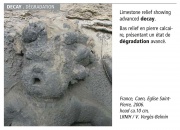Difference between revisions of "Decay"
Jump to navigation
Jump to search
| Line 4: | Line 4: | ||
Stone deterioration, or decay, occurs form many reasons. The physical actions of sun, rain, wind, and temperature changes cause internal stresses and surface abrasion that can result in disintegration. Additionally, the chemical actions of hydration and oxidation can slowly dissolve and weaken some stones. Also, pollutants, such as smoke, fumes, acids and particulates, can react with and degrade many stones | Stone deterioration, or decay, occurs form many reasons. The physical actions of sun, rain, wind, and temperature changes cause internal stresses and surface abrasion that can result in disintegration. Additionally, the chemical actions of hydration and oxidation can slowly dissolve and weaken some stones. Also, pollutants, such as smoke, fumes, acids and particulates, can react with and degrade many stones | ||
| + | ==Resources and Citations== | ||
| + | |||
| + | * ICOMOS-ISCS: [http://www.international.icomos.org/publications/monuments_and_sites/15/pdf/Monuments_and_Sites_15_ISCS_Glossary_Stone.pdf Illustrated glossary on stone deterioration patterns] | ||
[[Category:Materials database]] | [[Category:Materials database]] | ||
Latest revision as of 09:52, 18 July 2022
Description
Stone deterioration, or decay, occurs form many reasons. The physical actions of sun, rain, wind, and temperature changes cause internal stresses and surface abrasion that can result in disintegration. Additionally, the chemical actions of hydration and oxidation can slowly dissolve and weaken some stones. Also, pollutants, such as smoke, fumes, acids and particulates, can react with and degrade many stones
Resources and Citations
- ICOMOS-ISCS: Illustrated glossary on stone deterioration patterns
